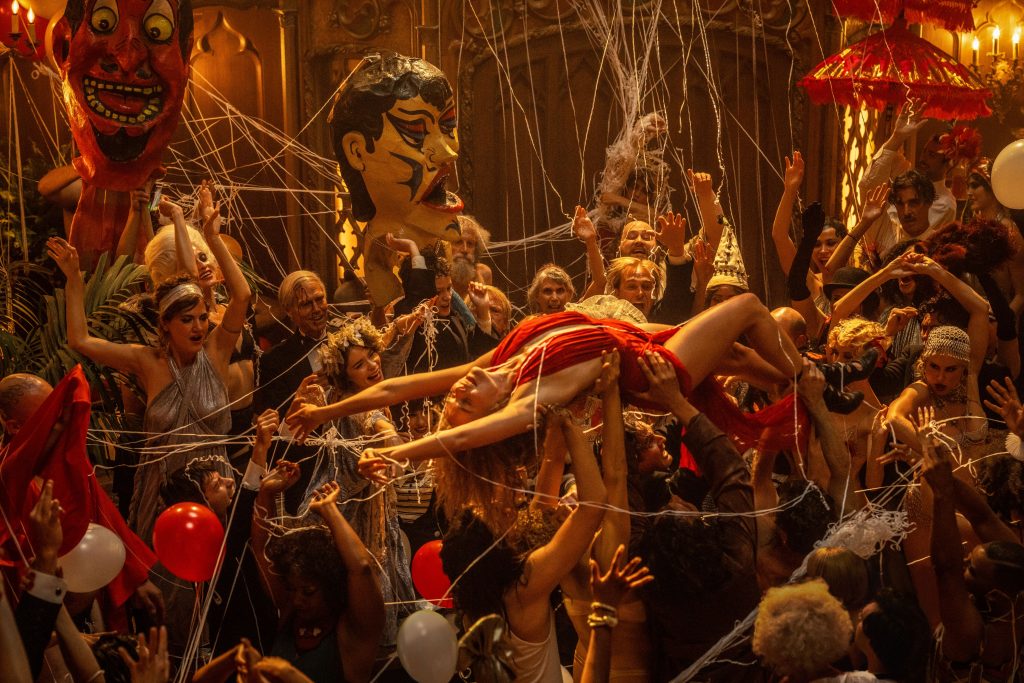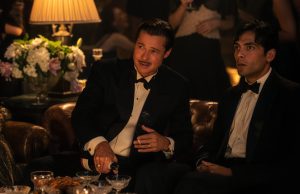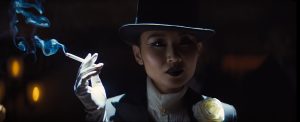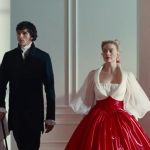Review: “Babylon” or Bacchanal?

The opening of Damien Chazelle’s Babylon gives form to the moniker of “Wild West”. From a bacchanalian hellscape of a party, queer performers and stars and drugs and sex galore, the scene is set perfectly in the dazzling – if not overly extended – party scene. It’s here that we meet Manny Torres (Diego Calva) who wants desperately to become a Hollywood exec. He meets Nellie Moore (Margot Robbie), an up and coming actress who may be a bit too long in the tooth to be called an ingenue, but what she lacks in grace and elegance she makes up for in sheer determination, self confidence, and complete lack of shame.
Together they become enveloped in the world of Jack Conrad (Brad Pitt), a star at the apex of his fame (the top, right before the fall), and Hollywood execs like James McKay (Tobey Maguire) and Irv Thalberg (Max Minghella). Finally rounding out the cast is the bisexual cabaret phenom Fay Zhu, who is modeled after Anna May Wong (Li Jun Li), and trumpet player Sydney Palmer (Jovan Adepo). Also joining the cast are cameos from Flea, Olivia Wilde, Lukas Haas, Samara Weaving, and Eric Roberts (who shows no signs of stopping after 717 roles).

At its core, Babylon is a sort of origin story for Singin’ in the Rain. Characters like Don Lockwood, Cosmo Brown, and Lina Lamont are fleshed out and removed from the gauzy finish of Hollywood’s golden age. We see the dirt and grime mix in with the raw talent and desperation for adoration. In this vein, Babylon acts like both a love letter to Hollywood and a lashing to the industry that broke so many rising stars. As technology caused films to advance, we saw the disappearance of those left behind. Those who couldn’t learn the game well enough to play it, and those who simply got played.
For this, and applying a bandage to Hollywood’s pre-code era losses, Babylon is a triumph. It’s big and bright, and there’s movement in nearly every frame. The extravagance and performative nature of Hollywood are all lined with a thin layer of grime that often goes overlooked. This film casts a megawatt spotlight, bringing light to every dark place. And for 99% of the film this works, but there are two scenes in particular that upend the film for me.

Both have to do with the people of color who are leads in the film. There’s Manny, who is from Mexico, but as he starts climbing up the ladder of power tells people he’s from Madrid, complete with an oft-fading Castilian accent. Then we have Li Jun Li as Lady Fay Zhu and Jovan Adepo as Sydney. I must stress that these actors all did phenomenal jobs. The errors I see are not with them, but rather the very machine this movie was attempting to send up.
In a movie where a Latino man is given success, it’s due in part to complete assimilation to white values. To the point where he uses this power to make Sydney demean himself for a film. On the other end of the spectrum, somehow Jun Li became the magical negro of the movie, appearing at just the right times to give words of encouragement when our white stars were in need.
Their stories are important and need to be told and, outside of Adepo’s scene, I think were necessary to the plot. I just don’t know that Chazelle was the one to tell them. Now, before you begin with, “White directors can tell stories for people of color!” Please know that I don’t disagree. It’s just when that white director has a precedent for centering white stories around Black narratives, there are going to be issues and this project is no exception.
At over three hours, there’s absolutely no reason more story couldn’t be given to flesh out the characters of color. Because if you give us more of them, give them humanity and not just the impossible luck of being in the right place at the right time, then you can earn the very real scenes of their abuse. As it stands, after two movies that started the “White People Freaking Out About Jazz” genre, I don’t have a lot of faith in Chazelle telling these stories. And Babylon has shown me that my fears were founded.

There were minutes upon minutes of elephant dung, and crocodiles, and CHUDs who fought as a form of entertainment. Of Brad Pitt basically playing Leonardo DiCaprio from Once Upon a Time in Hollywood and Margot Robbie living off the dividends of her Harley Quinn accent investment. Minutes of naked dancers, after parties going awry, and following hippies to second locations. Nearly an hour devoted to a film set run amok in the twenties and you know what? I’m here for ALL of it. But, if at the same time you can’t provide your characters depth of backstory, and the audacity of it being pre-code and not an ounce of queer content that wasn’t purely for spectacle, then it makes me want to check out of the whole. Which is a shame because as an experimental film, Babylon has a lot going for it.
But I don’t know that I’ll be sitting through it again.
Score 2.5/5
Author: StickyKeys
Help support independent journalism. Subscribe to our Patreon.
Copyright © The Geekiary
Do not copy our content in whole to other websites. If you are reading this anywhere besides TheGeekiary.com, it has been stolen.Read our





Brilliantly stated. Just watched it, finally, and I couldn’t agree more on every point. This film was far too long and spent way too much time on grotesque displays of all manners of bodily fluids to not have made greater investment where it mattered.